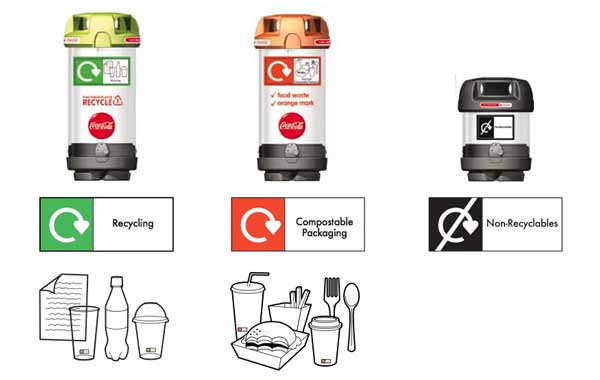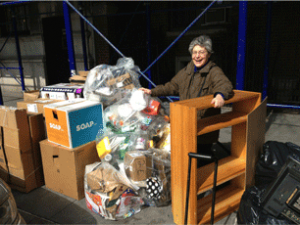
Water rains down from the Olympic Rings at the 2012 London Olympics Opening Ceremony (Image: musicfondue.wordpress.com)
Every four years, we marvel at the strength, speed and grace of the most gifted athletes from around the world at the Olympic summer games. The fireworks, theatrics, and parade of the world’s most elite athletes draw millions of spectators, live and virtual, to watch this world-renowned event. Last night, I watched in awe as the US women gymnasts catapulted themselves off the vault and swirled around the uneven bars as if it were as easy as skipping down the street. As my friends ohh’d and ahh’d at the talent of these competitors, I couldn’t help but think of all the waste the Games must generate. So I did what any inquisitive mind in the 21st century would do—I Googled Olympics 2012 Waste.
The Road to the Gold
As over 2 million articles related to these words popped up, I quickly realized just how energy and resource intensive the Games demand on their hosting cities. The transient nature and large influx of visitors—about 10 million—for a mere three weeks makes this event perhaps one of the most difficult for sustainability and waste management coordinators to plan. In particular, the hectic schedule of the competitions leaves little time for fans to pack drinks and food and thus buy these items on-the-go, which leads to a lot of consumer waste.
To address this problem, London Organizing Committee of the Olympic Games and Paralympic Games (LOCOG) decided to only allot food and beverage companies vendor space if the product containers met the European Composting Standards (EN 13432). Considering that Coca-Cola anticipates selling over 20 million bottles of soda and McDonald’s plans serving 14 million meals during the Games, this initiative may divert over 3,300 metric tons of drink and food waste from the landfill. That is the equivalent of 83 fully loaded semi-trucks!
A Golden Effort
To accomplish their 70% waste avoidance goal LOCOG not only partnered with companies to design compostable packaging, but also compost receptacles, as shown in the picture below.

Options for recycling, composting, and discarding non-recyclable waste available for London Olympics attendees.
The compostable waste items and the compost bin are both color-coded orange to help avoid confusion. Additionally, volunteers will stand by some of the receptacles and help fans place their waste in the right bin. Another team of volunteers will also sort the trash behind the scenes to ensure that only true waste is sent to the dump. This compost will then be sold as fertilizer and the proceeds will benefit non-profit organizations such as the London Food Bank and the Boys & Girls Club.
The Gold Standard
While the excitement of the Olympics got me thinking about this topic, the methods that LOGOC used to increase composting rates are easy to implement within our own communities. Simply placing a third bucket next to your trash and recycling bins is a great first step to composting. Depending on where you live, you may have option to donate it to a local community garden, give it to the city, or use it as your own fertilizer for your garden. So whether you are planning a big scale event like the Olympics or simply looking for new ways to reduce waste in your home, composting can help achieve a zero waste goal.
So I would like to know—do you compost? What ways do you use your compost? Does your community have the infrastructure to help facilitate composting? How can we overcome the barriers that prevent more of us from composting?




It is a really nice article and totally true. I live in London and most areas now do food waste recycling. We have a small brown tub in the kitchen and every week we put in a new cornstarch bag as a liner. In there goes chicken bones, leftover salad that had dressing on it, wine corks, scrapings from plates if anybody didn’t finish up. When the cornstarch bag is full, we tie it up and put it outside in the bigger brown bin (it has a tight lid on it). That gets picked up once a week with the other recycling bins and landfill black bags.
All stuff that is compostable goes in the big composter in the garden. (We can get the composters from the Council really cheap, as they are urging us all to compost, to create our own ‘gold earth’ to nourish our gardens, after it composts down — takes about a year.) In the composter goes all the stuff from leftover making a salad, for example – old leaves of lettuce, the stems and cores from apples, potato peels etc. Nothing can be put in that was ‘cooked’ or processed, or it doesn’t rot down, and it will attract vermin. We also put in egg cartons and old newspaper or cardboard, to make a nicer compost end-product. A zillion worms live in our composter, and the robins love when we open it because a few little fruit flies come out and they get a treat!
OK gotta go watch the Olympics….. Keep up the great work, my friends of the earth. LT
It is so great that sustainability is a big part of the Olympics. I hope the publicity will inspire more people to take action. The amount of waste we collectively produce is so overwhelming and daunting (have you heard about the Great Pacific Garbage Patch? http://bit.ly/WikiGarbagePatch. Although, I just read this http://bit.ly/GarbageUpdate….. no matter the exact makeup, we can all agree it needs to improve). Anyway, I have found that by doing small things, it does help. To start with, if everyone drastically reduced the amount of plastic cups, plates and utensils used, that would make a huge difference. Estimates say we dispose of 60 billion cups, 20 billion eating utensils and 25 billion plates in the US per year. It’s easy – here are some ideas http://bit.ly/ReduceWaste
Thanks for the link! I completely agree, small steps in just reducing the use of plastic plates, cups, and utensils would reduce our waste tremendously every year.
Cool information. The third bin for compost is certainly a great idea, but I think it’s the team of guiding volunteers that is really impressive. Most people don’t want to, and don’t, stop and think when they throw away their trash. We need to think like the Olympic coordinators!
On another anti-waste note, I was really excited to learn that London is using the footsteps of actual fans to create renewable energy. Check it out: http://www.pavegen.com/west-ham-dashboard.php
I just moved to NYC and don’t know much about compost options in my area, but now I’m inspired to look into it. Thanks!
Yes, its great that people are willing to donate their time to help educate others and sort waste. The footsteps website is awesome-I think it always helps to be able to see, in numbers, the environmental impact of a particular behavior.
Here is a link I found about composting in NYC-http://www.nyc.gov/html/nycwasteless/html/compost/collections.shtml
Hope this helps!
To answer the questions posed in the article: “So I would like to know—do you compost? What ways do you use your compost? Does your community have the infrastructure to help facilitate composting? How can we overcome the barriers that prevent more of us from composting?”…. My answers are yes, and I use it for soil in the ggarden. I am surprised at how quickly it becomes good soil. I do not know of any mechanisms in my town to facilitate composting, and we are considered a ‘farm town’ so maybe they’d be open to starting something. From talking with friends, I think the biggest barriers are that people think it will create a mess or that it is difficult, neither of which are true! It’s easy and creates less trash to put out each week.
Ilene, when my mom first started her composting pile, I remember that all of our neighbors were so worried it would create a big mess in the kitchen and take too long to decompose. However, because we emptied our compost container everyday into a big fertilizer pile next to the garden, we never had a problem with mess or the pile “getting gross”. Now, most of the neighbors also save their scraps and put them in the pile. We were all amazed at how fast it becomes great soil! We have created our own community garden, which is fun and the food tastes great. Thanks for the post!
Yes, I have composted for a long time. A couple of years ago I got tired of always having to toss stuff into the bin outside the back door and added a worm composter to my kitchen. It’s one of those “upward migration” systems where the worms start in the bottom bin, and as that fills you just add another bin on top and they migrate upwards as they finish processing what’s in the bottom. It’s pretty darn cool! Fits under the counter so it’s easy to access, takes practically no care other than checking the moisture level, smells only like fresh soil, and generates great compost for my garden. Worst problem we’ve had was when some fruit I threw in there apparently had fruit flies and for a while I had them buzzing around the kitchen. I solved the problem by putting a new bin on top of that one and then opening the infested bin outside a few weeks later. Fruit flies flew out, I closed it up again and repeated a couple of weeks after that when the worms were finished with the compost and just left the compost outside to finish. Haven’t had any trouble since.
To answer the rest of your question, our Township has recycling of pretty much all plastics and newspaper, but nothing beyond that. Certainly no support of composting — knowing our Township Council if they put their minds to it they’d probably try to prohibit it 🙂
Good article Miranda! Nice that you address the issue of waste with regard to the Olympics. Unfortunately I am not good at composting. But I will try to steer up:) Keep working on it!
Thanks Lars for commenting! Do you have composting infrastructure in your community??
It’s great to read about such an interesting aspect of the games that generally is ignored. I was surprised that there was so little publicity about this initiative since it is a first for the Olympics and it is amazing to see sustainability put into action on such a large scale. I originally heard about plan while I was studying abroad in London in 2010. There I was able to take a course on the then-upcoming Olympic games and thus I had the privilege of meeting with some of the members of LOCOG. It was clear from talking with them and reading about the goals for the Olympic legacy, that the committee was excited at the prospect of making the event more sustainable. I then was surprised to hear so little about it as the games came and passed. As an avid Olympics spectator, I can say if there had been coverage, I would have seen it, but I didn’t see any.
I had not seen the system of color-coded waste receptacles previous to reading this. The fact that they made it so easy for people to know what to do with their waste likely helped them meet their goals, but I would be interested to know how successful the system actually was. My college started a similar system in one of the dining options on campus during my sophomore year when the cafe began using some compostable products. There were three waste receptacles with pictures of what should be deposited in each above them. As an environmentally conscious girl, I don’t mind spending the extra three seconds to sort my garbage, but it seemed some of my fellow classmates couldn’t be bothered to make that small effort. Knowing that makes me sadly question how effective the system was at the Olympics. I tried to look into it, but I could not find any info. Has anyone heard about the success of the system?
In terms of my own composting habits, I regret to say that I’m not very good at it. During college, the on-campus apartments I lived in senior year were given a third bin that a group would come collect once a week. The ease of having such a program motivated me to try and compost what I could, but since leaving college, I don’t even know where I would take my compost if I started to collect it. Maybe I can use the Olympics as my inspiration today and look into that now.
Thanks so much for your response! I also was surprised by the lack of coverage the Games received for their sustainability initiatives considering how much thought and planning went into the process. My university also adopted a color-coordinated recycling/trash/composting program during my last year of study. Like yourself, I didn’t mind taking the time to read the signs to figure out what bits of my lunch go in which bins. However, many of my peers did not want to spend the extra time and just put it in the nearest bin. After repeat failures, the organizers of this initiative decided that people from their team would have to volunteer to sort and educate people by standing by the bins. This is the same practice that was adopted at the Olympic games to help keep waste sorted.
Regarding whether there are any post-games sustainability reports, it does not seem as though any official document has been published from LOCOG. However, the non-profit organization Bioregion (who worked with LOCOG to establish the games sustainability goals) published a scorecard for the London 2012 summer Games. This scorecard is quite brief and does not address their composting achievements directly, but did give the category “public information campaign to promote high quality front-of-house waste separation” the highest marks, indicating that they believed this goal was met.
(check out the report at http://api.ning.com/files/xI9ZzIUFp0IuQ68ZQ3CuX4EiTnEba3lVB49Sc4dFOZfBfIbCXIocLwHpNoycI67GqnBQVne-iPlqXZkLFLgwhvVpla*4FfO-/scorecardforweb.pdf)
Composting can be difficult to figure out, especially if you live in an urban setting or your community does not have composting infrastructure. I am moving to a new home that has a place for a garden. My housemates and I are planning to compost and use it for fertilizer! Once I get this figured out, I will definitely share it in a post (complete with pictures of course!)
Thanks again for your reply, and look around your area to see if a communal composting program doesn’t already exist!
I have always thought about what happens with all merchandise materials that get left over after large events. I guess most of the times it ends up in landfills. It feels like such a waste, and also a bit melancholic, as if the host city is the star for 15 minutes, and then stripped down, dumped and abandoned.
I then heard a story about a small non-profit company (People for Urban Progress), based in Indianapolis. The company started out by the very idea that a 18-yards leftover fabric from the roof of a Dome, which once served as a landmark in the city, could be better taken care of than disposed at a landfill. The fabric has since been transformed into everything from handbags to bus stop shades, and in this way once again become part of the city. This year, Super Bowl decided to donate their leftover merchandise to the company to be used for various purposes. It’s a great idea, not only to minimize waste, but also to let events such as the Olympics or Super Bowl be part of the city longer than a day or a few. It also enables everyone to be able to carry on the story and history of the event.
It’s amazing how such a simple strategy can have such a large impact. I think a key factor to the success of this method is that there were volunteers aiding people with their trash, making sure they put it away in the right bin, which is much more effective than just placing the recycling and compost bins there without an attendant. Unfortunately, many people are still not familiar with what it means to compost and what waste can be recycled, so the volunteers play a pivotal role.
That being said, there are instances where simply placing more waste bins in an area can lead to an increase in waste avoidance. The other day, I was walking across central park on W 59th street holding a cup of coffee that I wanted to throw away. I walked the whole perimeter of the park and there was only one trash can on that walk. People who are not environmentally conscientious would not have been as patient, which is why it could be effective to place more bins around the city.
I recently studied abroad in Barcelona, where they have an impressive recycling system in place. There are large color coded bins on most streets where people can throw out their paper, plastic, and food respectively. If New York would adopt a similar method, we could be much more effective in our waste management.
An outstanding share! I’ve just forwarded this onto a friend who had been conducting a
little homework on this. And he actually ordered me dinner because I found it for him…
lol. So allow me to reword this…. Thanks for the meal!!
But yeah, thanks for spending some time to discuss this topic here on your web page.